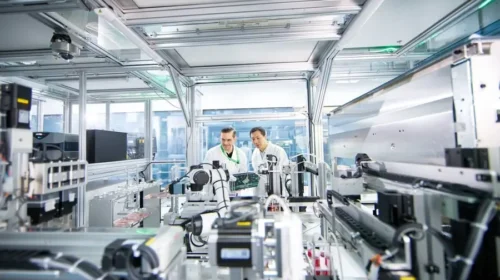Unisound launches modest IPO into crowded Hong Kong market

The AI services provider is aiming to raise a relatively modest $40 million, or just over 2% of its share capital, as it rapidly burns through its cash
Key Takeaways:
- Unisound aims to raise about $40 million through a Hong Kong IPO, with its shares set to start trading on June 30
- The AI services provider recorded 29% revenue growth last year and has a relatively diverse customer base, but is rapidly burning through its cash
By Doug Young
Is the market for new AI listings becoming oversaturated?
That question was front-and-center in the latest listing document from Unisound AI Technology Co. Ltd. (9678.HK), which launched its Hong Kong IPO on Friday with a very modest fundraising target of up to HK$320 million ($41 million). The company plans to sell 1.56 million shares in the listing, representing just 2.2% of its share capital, which seems to show it’s not extremely confident of big demand for the stock.
What’s more, Unisound said it has already found cornerstone investors to buy about one-third of the shares on offer, meaning it’s aiming to sell around just 1 million shares to other investors for between HK$165 and HK$205 apiece. A pricing at the top of its range would give the company a market value of HK$14.5 billion, though it seems more likely it could price closer to the bottom, which would value it at $11.7 billion, according to the latest listing document.
The stock is set to make its trading debut on June 30.
So, why is Unisound so hesitant with this offering? The company provides AI products and services designed to help healthcare and more general clients from sectors like hospitality and transportation, run their operations more efficiently. It’s growing at a respectable, though not eye-popping, rate, including 29% revenue growth last year.
But the company is cash-flow negative, and consumed over half of its cash last year. It’s also making its listing into one of Hong Kong’s strongest IPO markets in years, which means sentiment is positive, but also that investors have lots of other choices – including a growing number of other AI companies that have listed or are moving in that direction. While most of the AI companies are losing money and are also cash-flow negative, many have larger cash reserves.
Unisound’s cash reserves tumbled to just 156 million yuan by the end of last year, down by more than half from 379 million yuan at the end of 2023, as the company reported 319 million yuan in cash outflow during the year, according to its prospectus first filed in March. Its IPO will provide some relief by providing roughly another 275 million yuan in new cash. But that’s still not too much, considering its current rate of cash burn.
“We believe that we possess sufficient working capital, including sufficient cash and liquidity assets, to meet our present needs and for the next 12 months from the date of the document,” the company said in its listing document, reflecting its tenuous situation. Of course, it’s quite likely Unisound will sell more shares to raise additional cash through secondary offerings, especially if the initial offering gets a positive reception. But that’s far from guaranteed.
Despite the cautionary signs, Unisound is still aiming for a relatively high valuation compared with its peers. Its price-to-sales (P/S) ratio would range from 11 to 14, depending on how its shares price. But even a pricing at the low end of that range would be equal to the P/S ratio of 11.5 for SenseTime (0200.HK), and is well ahead of the 3.82 for Fourth Paradigm (6682.HK), two other AI companies that are both much larger.
Solid financials
Despite its precarious position, Unisound’s financials look relatively decent, and it also seems quite disciplined in terms of cost controls. The company is an old-timer on China’s AI scene, with a history dating back to 2012 when its predecessor was set up by Liang Jia’en and Kang Heng, who both have scientific backgrounds. It began working on its core Atlas AI infrastructure, which underpins its current products, in 2016. The company counts the well-respected Qiming as one of its investors, with more than 6% of its shares.
Unisound divides its business into two main segments. The larger of the two is its general “life” segment, which accounts for more than 80% of its revenue and includes customers from the residential and commercial property sectors, as well as hospitality and transportation. Its customers include the likes of the Shenzhen Metro system, which used Unisound’s services to create a voice ticketing system for one of its lines.
The other segment is healthcare, which helps companies do things like record medical records, manage their insurance payments and conduct quality control functions more efficiently. That segment accounted for about 15% of the company’s revenue last year, though it was growing more quickly than the “life” segment.
From a customer perspective, Unisound looks quite sound with a relatively diverse customer base, showing its products have relatively broad appeal. That’s something you don’t always see in the emerging AI services sector, where companies are often reliant on just a handful of customers for a big chunk of their revenue. By comparison, Unisound’s five largest customers accounted for just 26.7% of its revenue last year, down from 30.8% in 2022.
The company’s overall revenue grew 29% last year to 939 million yuan from 727 million yuan in 2023. Its gross margin looked relatively healthy last year at 38.8%, though we should note that was quite a bit lower than SenseTime and Fourth Paradigm, whose gross margins for the year were both around 48%.
Unisound’s biggest expense is R&D, which is quite common in the fast-developing AI space. But even there, its R&D spending growth rate of 29% last year was in line with its revenue growth, showing the company is trying to take a disciplined spending approach. Its sales and marketing expenses grew by a slower 20%, and its administrative costs actually fell slightly last year. As a result, its overall operating expenses rose just 21%, quite a bit slower than its overall revenue growth.
Despite that discipline, the company’s adjusted net loss still widened by 22% last year to 168 million yuan from 137 million yuan in 2023.
At the end of the day, Unisound looks like a relatively sound company, with good growth prospects, a diverse customer base and disciplined spending. Now, it just needs to find a way to keep funding its operations until it can become profitable, which appears to be at least another three to four years away.
To subscribe to Bamboo Works weekly free newsletter, click here





